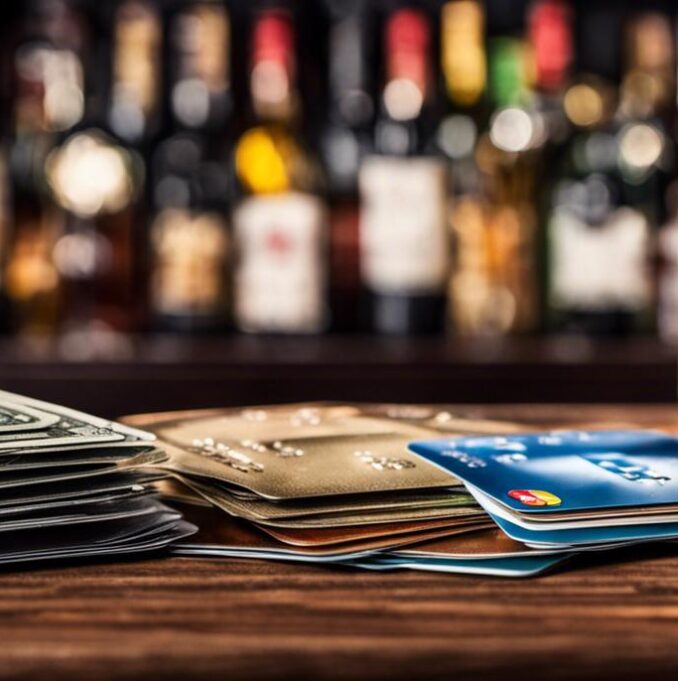
Complete Explanation Of Buying Liquor with a Credit Card
Credit cards play an integral role in offering convenience way of payment. One category of such transactions includes the purchase of alcoholic drinks. Although that might seem like a relatively straightforward practice, it comes with legal and practical implications. This discussion will provides an insight perspective into the legality of buying liquor with a credit card, highlighting the age limit, and laws regulating online and phone transactions.
In additionally, it we will look into the credit card policies upheld by various liquor stores, and the potential extra charges for using such payment methods. However, some light will be shed on managing credit card purchases of alcohol responsibly, underlining the potential repercussions, and offering advice to maintain a healthy credit score.
RELATED:- How Do Laundromats That Take Credit Cards Payment Systems Work
Table of Contents
Legality Of Buying Liquor With A Credit card
Legal Age to Buy Alcohol
In the United States, the legal drinking age is set at 21 years. This age limit also applies to the purchase of alcohol, regardless of the method of payment used. Failure to follow this age limit can result in legal ramifications for both the seller and the purchaser.
Credit Card Purchases
Using a credit card to purchase liquor is generally accepted in most physical retail locations across America. Whether you’re buying from a grocery store, a liquor store, or a restaurant, you would typically be able to use your credit card as a payment method.
Age Identification
Regardless of your payment method, retailers are obligated to verify your age before completing the sale of alcoholic drinks. For credit card transactions, this is typically done by checking a valid photo ID, such as a driver’s license or passport. Some retailers also use electronic age verification systems, which can instantly check the age and identity of a customer using a variety of data sources.
Online and Over-the-Phone Sales
When it comes to online or over-the-phone liquor purchases, the rules may vary by state. Some states allow alcohol to be sold and shipped directly to consumers, while others do not. In states where it is permitted, online retailers are still required to check the buyer’s age before completing a sale. This can be done through online age verification tools, or by requiring an adult signature upon delivery.
Federal Regulations
At the federal level, the Alcohol and Tobacco Tax and Trade Bureau (TTB) oversees the distribution and sale of alcohol in the U.S. This agency, however, primarily focuses on regulation of manufacturers and importers, not consumers. Issues such as age verification and direct-to-consumer sales are typically handled at the state level.
A Word of Caution
While you can generally buy liquor with a credit card, it’s essential to remember the responsibility that comes with it. Excessive alcohol consumption can lead to a number of health problems, and misuse of credit cards can result in financial difficulties. Therefore, it’s crucial to always drink responsibly and manage your finances wisely.
Card Usage Restrictions
While credit cards are widely accepted at most commercial establishments, there can still be restrictions imposed by individual businesses. Some of these restrictions may include a minimum purchase requirement to use a credit card or additional fees to cover card processing costs. To avoid any confusion or inconvenience at the point of purchase, it is always recommended to inquire about the store’s credit card policy beforehand.
Purchases Of Liquor and Credit Card Management
Can You Buy Liquor With A Credit Card?
In the majority of cases, yes, you can purchase liquor using a credit card. This includes both online retailers and brick-and-mortar stores, and extends to drinking establishments such as bars and restaurants. Nonetheless, some regions or individual businesses may have policies in place that require cash or debit card transactions for alcoholic items. To avoid any potential unfortunate surprises, it is always advisable to check the accepted payment methods in advance with the establishment in question.
Credit Card Management When Buying Alcohol
It is crucial that when using a credit card to purchase liquor, you exercise responsible financial behaviors. Do not let the ease of using your credit card result in overspending on alcohol or any other products. The wide acceptance of credit cards can make it particularly easy to overspend without recognizing it because the repercussions are not immediate. Remember, any unpaid balances on your credit card accrue interest. Hence, it’s advisable to pay off your credit card balance every month to avoid paying high interest rates.
Potential Issues: Overspending and Credit Card Fraud
Overspending and fraud are two potential issues associated with using credit cards for any purchases, and alcohol is no exception. The ease of swiping a credit card can lead to purchases that exceed your budget. Being mindful of the purchases you are making is important to maintain control of your spending.
Meanwhile, the risk of credit card fraud cannot be ignored. Always be vigilant regarding who you give your credit card information to. Only use your card at reputable establishments and online stores to reduce your risk of becoming a victim of credit card fraud.
Impact on Credit History
How you use your credit card to buy alcohol can impact your credit history. For instance, running up significant amounts of debt on your credit card without paying off the balance each month can negatively impact your credit score. Therefore, it’s crucial to ensure that you pay off your balance every month. Continuous responsible card usage and timely repayment will contribute to a healthier credit score.
READ MORE:-
. Buying Alcohol With A Minors Debit Card: How and Can You
. Can You Buy Alcohol With A Minor’s Credit Card Or Debit Card
. Accessing What Was Purchased On A Debit Card
Tips for Managing Your Credit Card When Buying Alcohol
Here are some useful tips to help you responsibly manage your credit card when buying alcohol:
1 . Use your credit card wisely and avoid overspending. Stick to your budget.
2 . Ensure to pay off your balance each month. Carrying a high balance regularly can hurt your credit score.
3 . Keep track of your purchases. It’s easy to lose track of spending when it’s a simple card swipe away.
4 . Avoid buying alcohol if you are in a state of intoxication. Impaired judgment might lead to unnecessary and excessive spending.
5 . Protect yourself from fraud by using your credit card only at reputable establishments and online venues.

Credit Card Policies of Liquor Stores
Credit Card Acceptance at Liquor Stores
Liquor stores, like many other customer-facing businesses, can have their own unique rules and practices when it comes to credit card usage. For instance, while some stores may eagerly accept credit card payments, others may have a ‘cash-only’ policy. These regulations can be shaped by numerous factors such as local laws, the size and location of the store, as well as perceived security risks associated with card transactions.
Different Payment Policies Behind
The reasons liquor stores may vary in their acceptance of credit card payments often boil down to the costs associated with credit card processing. Credit card companies charge businesses a fee for every transaction processed using a card. This fee generally ranges from 1-3% of the transaction value, which can prove substantial for high-value purchases like liquor. In order to keep prices competitive, some small-scale or independent liquor stores may avoid these fees by not accepting credit cards. Furthermore, certain liquor stores may be situated in areas where cash payments are more prevalent, thus limiting the need for credit card processing capabilities.
Penalties and Extra Fees Associated With Credit Card Use
When using a credit card to purchase liquor, the policies of the card issuers and the payment processors may expose the card holder to some penalties or extra fees. For instance, if a card issuer qualifies liquor store purchases as ‘cash-like’ transactions, these purchases could be subject to the same fees as cash advances. These fees are often higher than the regular purchase interest rates and are applied from the date of the transaction, with no interest-free period usually applied to regular purchases. Not all credit cards or issuers follow this policy, but it’s worth inspecting the terms and conditions of one’s credit card to be sure.
Return and Refund Protocols When Using Credit Cards
In instances where the buyer may need to return purchased items, the liquor store’s return and refund policies come into play. When a purchase has been made with a credit card, most businesses will refund the amount back to the card that was used for the purchase, which can typically take between 5-7 business days. However, this may vary based on the store’s policies and the type of liquor purchased. Some liquor stores might omit refunds for opened or damaged products. Therefore, it’s important for the buyer to be familiar with and understand the store’s return and refund policies prior to making a purchase.
FAQ
Can you use credit card for liquor?
Many people wonder if it is possible to use a credit card to purchase liquor. The answer is yes, in most cases, credit cards can be used to buy alcoholic beverages.
Can you buy liquor with credit card Ohio
Can you buy drinks with a credit card?
Yes, it is typically possible to buy drinks with a credit card. Most establishments, such as bars, restaurants, and cafes, accept credit card payments as a convenient and widely-used method of payment. However, it is important to note that there may be some exceptions or limitations depending on the specific establishment or the amount of the purchase.
Can you use a credit card at a bar?
Yes, it is typically possible to buy drinks with a credit card. Most establishments, such as bars, restaurants, and cafes, accept credit card payments as a convenient and widely-used method of payment. However, it is important to note that there may be some exceptions or limitations depending on the specific establishment or the amount of the purchase.
Conclusion
Purchasing liquor with a credit card is generally accepted at most alcohol retailers. However, while many permit this form of payment, the types of cards accepted and any potential fees involved may vary. It is therefore recommended that buyers familiarize themselves with the payment policies of their selected liquor store, as well as their credit card agreement, to prevent any unforeseen issues. Further, the capacity to return items and receive refunds while using a credit card may differ greatly among businesses, so understanding these procedures in advance can aid in ensuring a seamless buying experience.




Be the first to comment